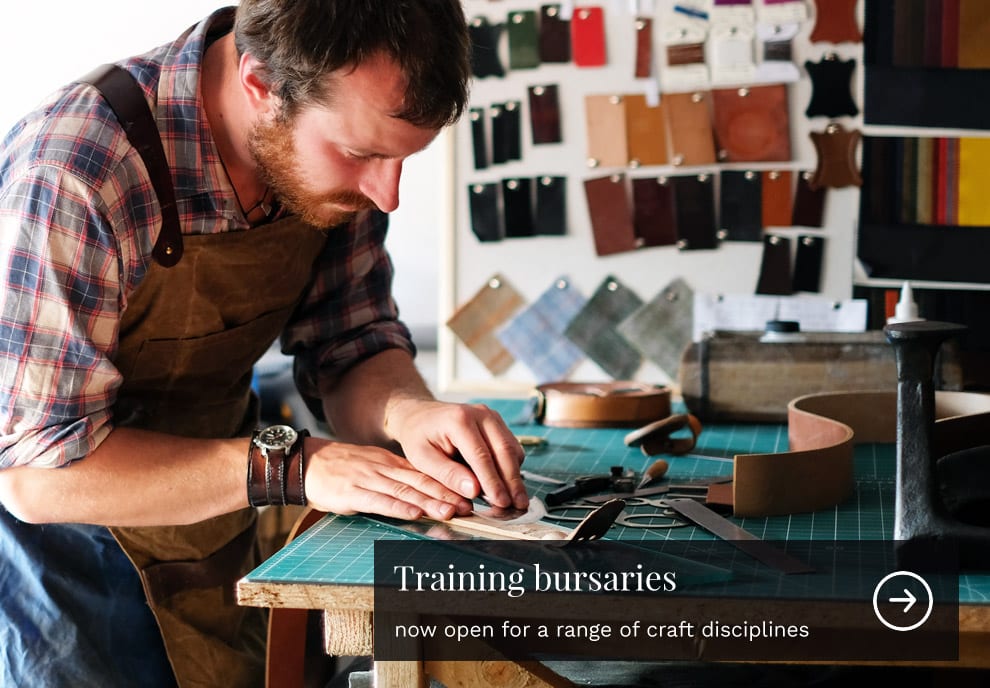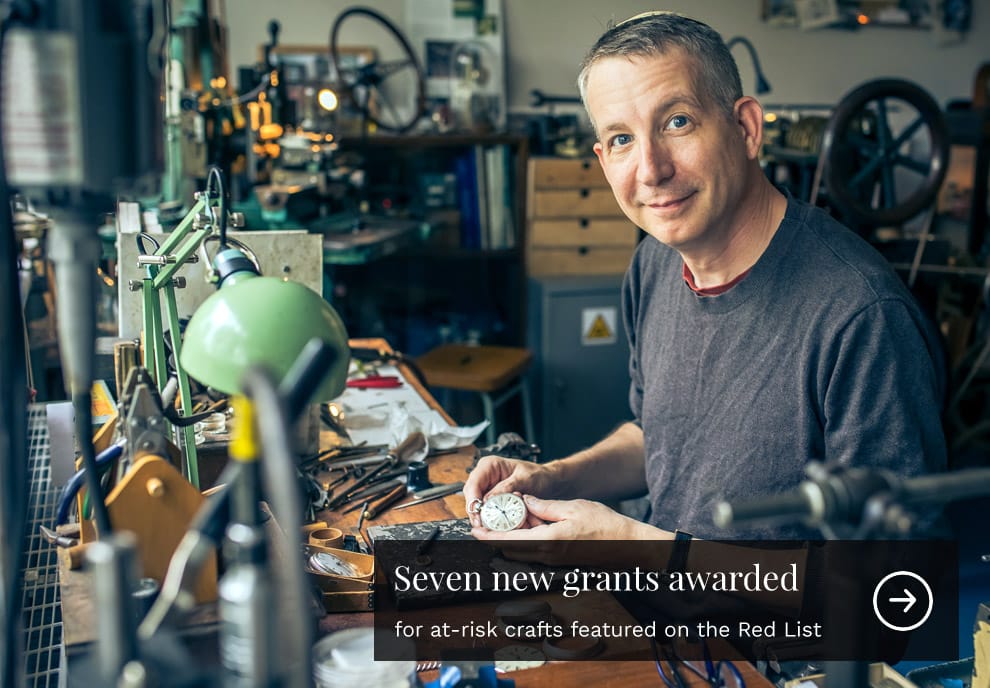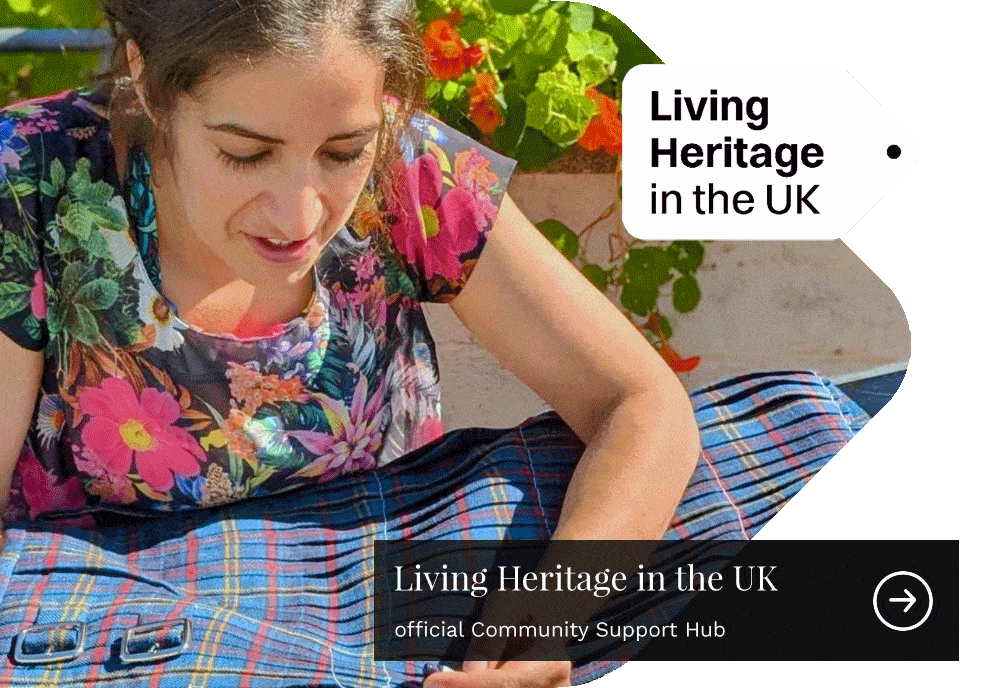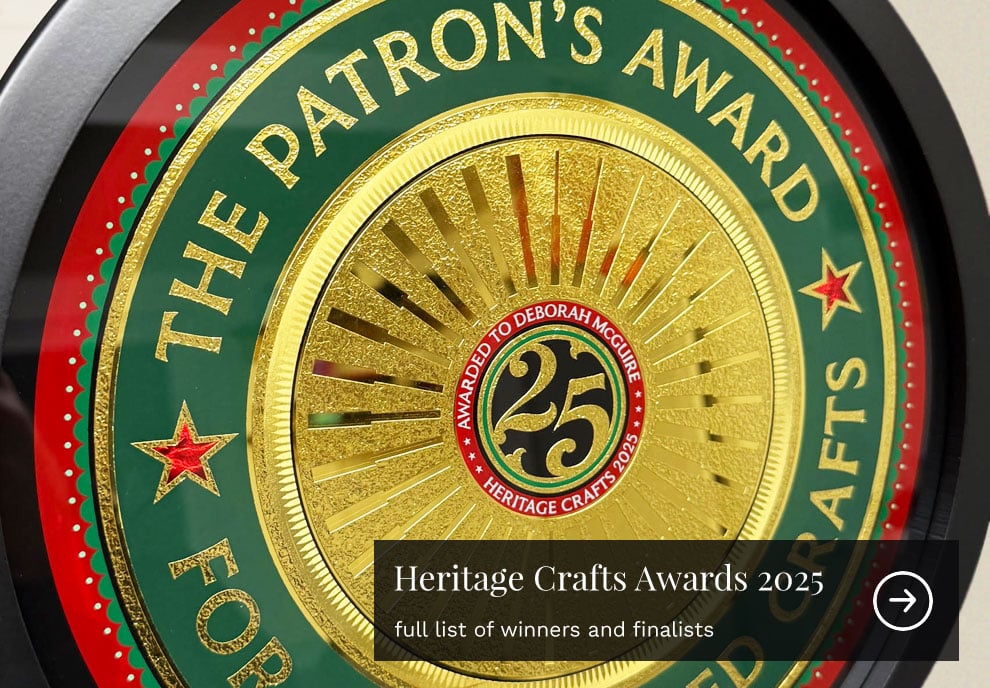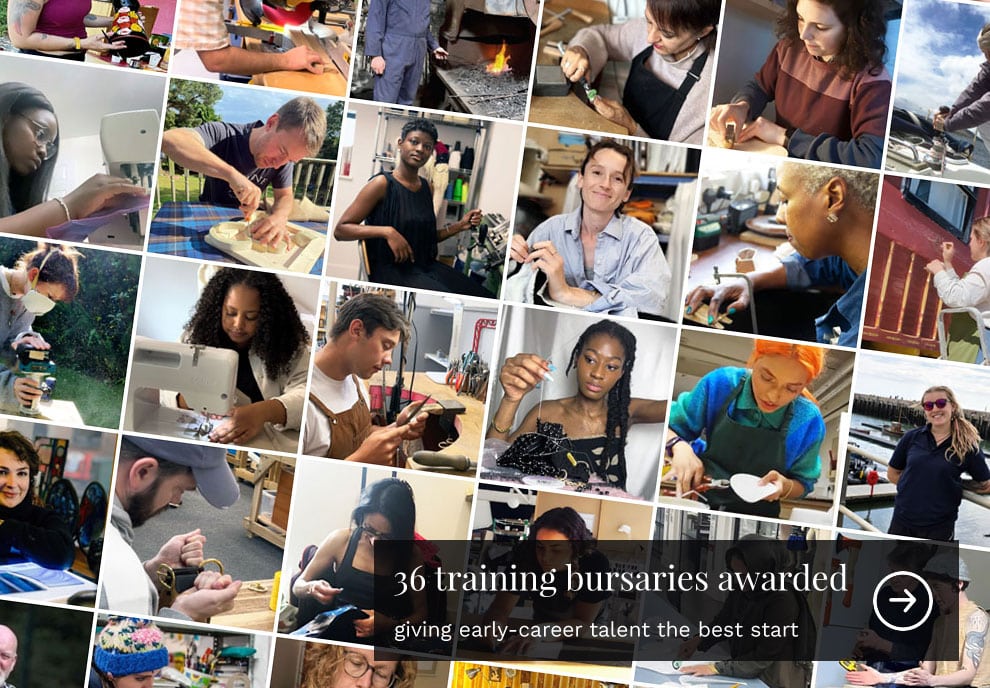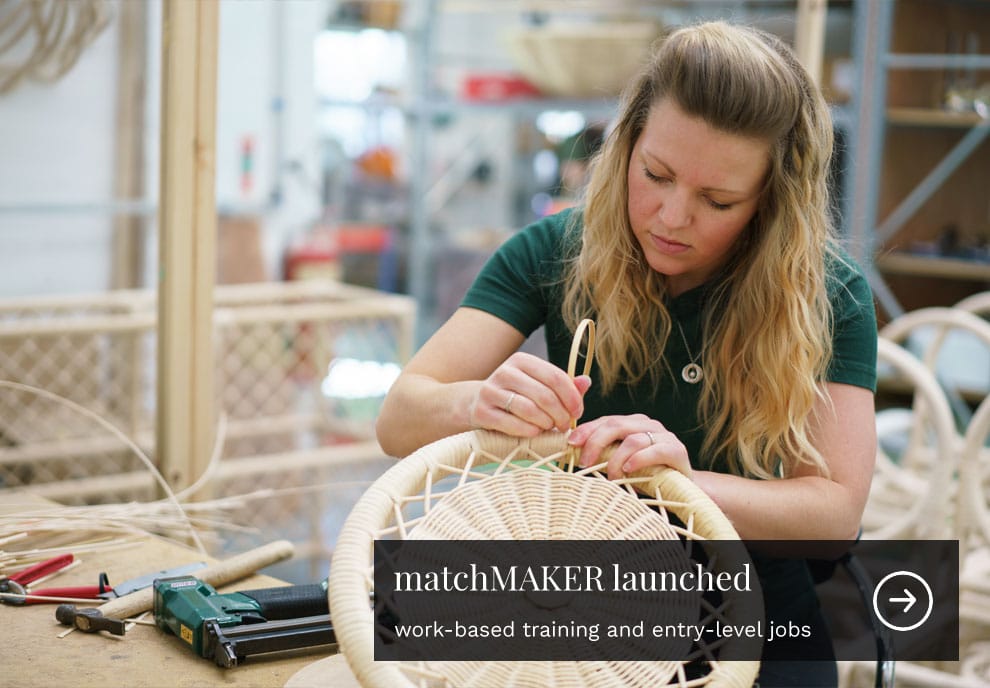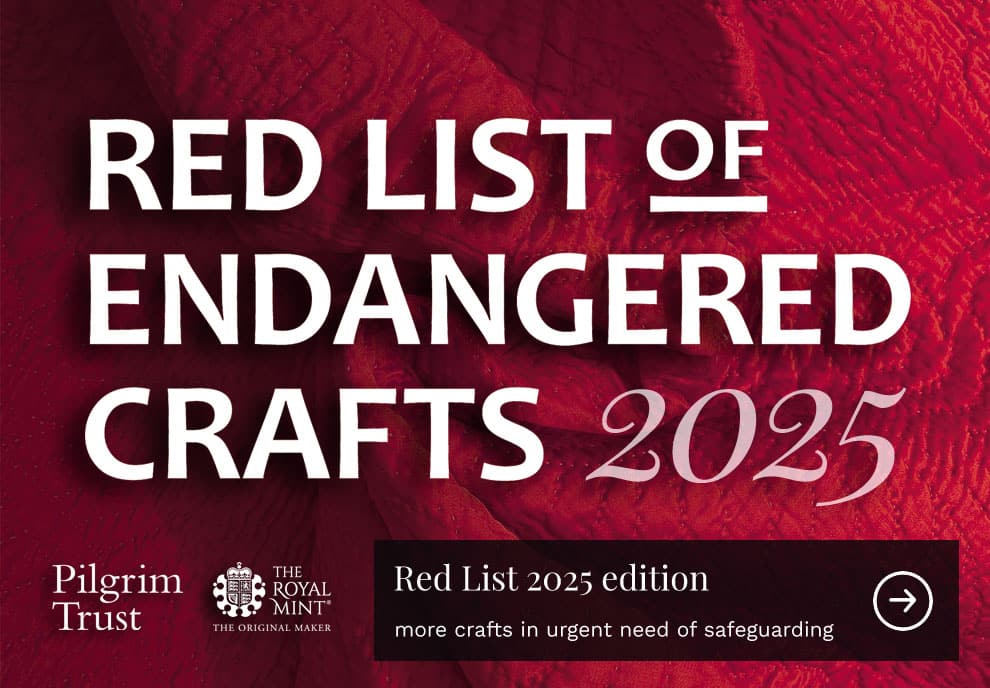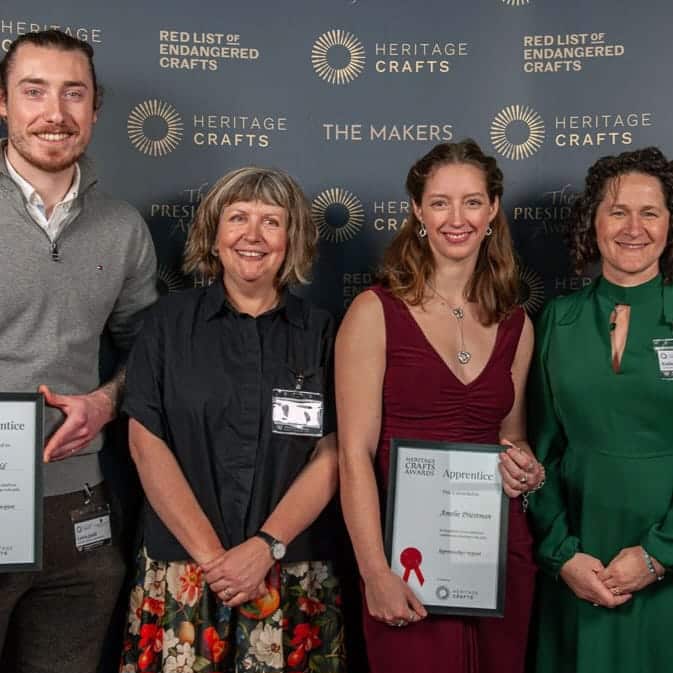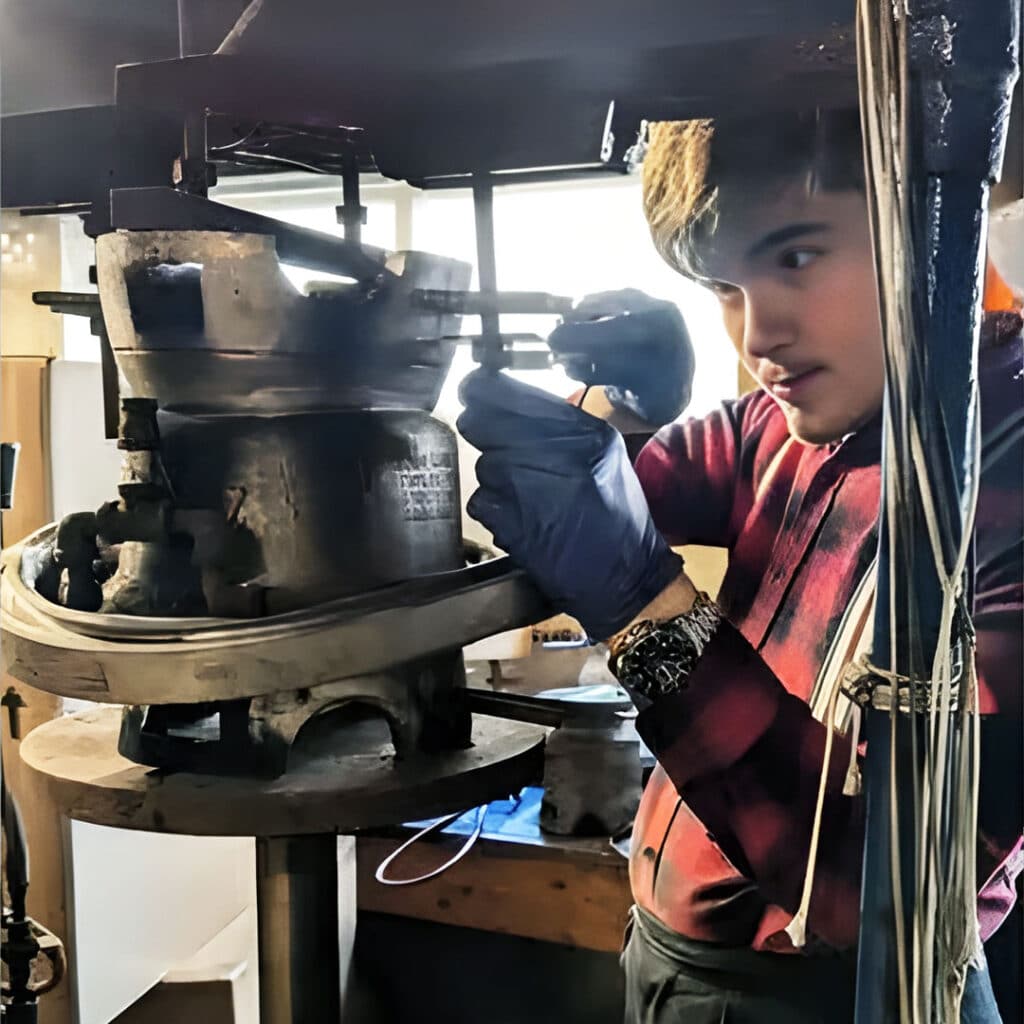Supporting craft heritage
We are the national charity set up to celebrate, support and safeguard traditional craft skills, and to facilitate a national conversation about their importance to everyone now and in the future.
We are passionate about ensuring that everyone has access to craft skills that have developed over generations, and which we believe will be vital in helping us tackle the challenges of the future – and to be able to enjoy making as part of a fulfilled life.
Our Patron is His Majesty King Charles III.
Featured makers
Make a donation
Heritage Crafts was set up just fifteen years ago. Since then it has gone from strength to strength, advocating at the highest levels for crafts, publishing the Red List of Endangered Crafts, and distributing 95 grants through the Endangered Crafts Fund. We have awarded 131 training bursaries, established the Heritage Crafts Awards and shone a spotlight on our world-renowned makers through 33 National Honours successes.
Many more people are now aware of traditional crafts and the objects produced by those who carry in their hands, heads, and also hearts the skills and techniques that have been passed down through the generations.
To continue this work we need your support. Please consider making a donation, however big or small, to help ensure that heritage craft skills in the UK are given the opportunity to thrive.
You may also be interested in
Becoming a Member
Becoming a Benefactor
Follow us on Instagram
Calling all aspiring and early career garment makers and costumiers! 👗👘🥻👔👙🩱👖👚🧥👕
Are you looking to master your craft, refine your skills, or undertake specialist training, yet can’t afford to get the skills training you need? We want to hear from you.
Applications for our 2026 training bursaries supported by the @costume_society are closing on Friday 30 March.
Fashion textile crafts can include (but are not limited to) dressmaking, tailoring, pattern cutting, hat making, millinery, glovemaking, fabric pleating, corsetry, and so on. Costume making can include garments and accessories made for theatre, film, television, musical performance, historical re-production, role play and so on. Check out the full list of inclusions and exclusions on our website.
Don’t miss the chance to take your craft skills to the next level. Funding is limited, so prepare your application early!
Linktr.ee in bio to apply or directly at https://heritagecrafts.org.uk/bursaries/fashion-textile-bursaries/
#heritagecrafts #fashiontextiles #costumemaking #traditionalcrafts
📷 2024 recipient @mia.lin.moore

This week’s #mondaymaker is Sheeba Kukreja @hatchfullyyours – an eggshell carver.
Sheeba specialises in hand-carved eggshell art, transforming real ostrich eggshells into illuminated heirloom lanterns and carving intricate sculptures from goose and duck eggshells. She also adorns quail eggshells with 24ct gold leaf for bespoke keepsakes.
Sheeba creates bespoke works that celebrate life’s most meaningful moments, including birth, love, faith and remembrance. Her work sits at the intersection of heritage craft and contemporary design, reviving an almost forgotten art form with elegance, symbolism and quiet resilience.
View Sheeba’s full profile on our maker’s directory: https://heritagecrafts.org.uk/maker/sheeba-kukreja/
#heritagecrafts #mondaymaker #eggshellcarving

Ready to take your shoe and boot making skills to the next level? 👞🥾🥿👠👢
Heritage Crafts, in partnership with the @worshipfulcordwainers, is now accepting applications for training bursaries of up to £4,000 in our craft-specific round!
Whether you are a newcomer looking to break into the industry or an early-career maker facing financial hurdles, this bursary is designed to help you gain the skills of hand-sewn shoe and boot making.
👉 Apply now via the linktr.ee in our bio or directly at https://heritagecrafts.org.uk/bursaries/shoemaking-bursary/
Deadline: 5pm, Friday 30 March.
#shoemaking #bootmaking #heritagecrafts #creativecareers #UKcrafts

#matchMAKER opportunity!
Trainee Master Setter
Location: London
Budrevich Fine Jewellery is a trusted partner of several of London’s most recognised, respected and established jewellery brands, who also undertake a wide range of commissions for private clients. Operating from their purpose-built, cutting-edge workshop in Hatton Garden, they are recruiting a trainee diamond micro-setter who is looking to master the craft.
You would be joining a small, specialist, expert team of master jewellers who are at the forefront of jewellery design and manufacturing. The role is open to setters, mounters or goldsmiths of all levels who possess a keen eye for detail, have a desire to learn and, most importantly, a genuine passion for making the very finest jewellery.
Find out how to apply at https://heritagecrafts.org.uk/matchmaker
#matchMAKER is the online platform for work-based training and entry-level employment opportunities hosted by @heritagecrafts and supported by @soanebritain.

Calling all aspiring saddle makers, side saddle makers, bridle makers, harness makers and collar makers! 🐎
Are you looking to master your craft, refine your skills, or undertake specialist training, yet can’t afford to get the skills training you need? We want to hear from you.
Applications for our 2026 training bursaries supported by the @saddlerscompany.saddlershall are closing on Friday 30 March.
Don’t miss the chance to take your skills to the next level. Funding is limited, so prepare your application early!
Linktr.ee in bio to apply or directly at https://heritagecrafts.org.uk/bursaries/saddlery-bursary/

#matchMAKER opportunity!
Willow weaver
Location: Suffolk
Deadline: 4 March 2026
Heritage Willow @heritagewillow are a small group of talented, traditional weavers who specialise in constructing continuous willow fences. Due to continued growth in demand for their work, they are expanding their weaving team this Spring by recruiting a willow weaver (either full time or part time).
No prior experience is necessary, as full training will be provided, though the successful candidate will need to be:
-Resilient and hard working.
-Reliable and a team player.
-Happy working outdoors in all weathers.
-Practical and good with their hands.
-Have excellent attention to detail.
-Positive, polite and professional.
Heritage Willow is based in Suffolk, with their farm HQ near Debenham. The majority of their work sites are local, between Ipswich, Norwich and the East Anglian Coast. This role would suit somebody within this area who can drive and has access to their own car. Occasionally, work is taken on across the country and there would be an expectation that you would participate in these projects which involve travel and overnight stays.
This is physically demanding but rewarding and creative work using traditional weaving techniques to build bespoke, beautiful willow fencing.
The role will be for an initial 6-month period with the potential for a long-term position thereafter.
Find out how to apply at https://heritagecrafts.org.uk/matchmaker
#matchMAKER is the online platform for work-based training and entry-level employment opportunities hosted by @heritagecrafts and supported by @soanebritain.

#matchMAKER opportunity!
Trainee pointe shoe maker
Location: Leicester
The Suffolk Pointe Shoe Company are recruiting for a trainee pointe shoe maker. You will receive full hands-on training and the chance to master a unique craft and contribute to world-class ballet pointe shoes.
What you will do:
-Learning and applying each step of the shoe-making process.
-Working at your own workstation, using traditional methods.
-Using hand tools such as hammers, scissors, brushes, and knives.
-Handling tacks, adhesives, and shoe lasts (foot forms).
-Reading and following order tickets accurately.
-Meeting quality and production targets in a fast-paced environment
Find out how to apply at https://heritagecrafts.org.uk/matchmaker
#matchMAKER is the online platform for work-based training and entry-level employment opportunities hosted by @heritagecrafts and supported by @soanebritain.

Ready to take your stained glass skills to the next level? 🎨✨
Heritage Crafts in partnership with the British Society of Master Glass Painters @bsmgp, is now accepting applications for training bursaries of up to £4,000 in our craft-specific round!
Whether you are a newcomer looking to break into the industry or an early-career maker facing financial hurdles, this bursary is designed to help you gain the skills of stained glass making, painting, and conservation.
👉 Apply now via the linktr.ee in our bio or directly at https://heritagecrafts.org.uk/bursaries/stained-glass-bursary/
Deadline: 5pm, Friday 30 March.
#stainedglass #heritagecrafts #glasspainting #creativecareers #UKcrafts

Craft inspiration direct to your inbox
Become a Heritage Crafts Fan and receive a free monthly newsletter about craft announcements, events and opportunities.
Subscribe
